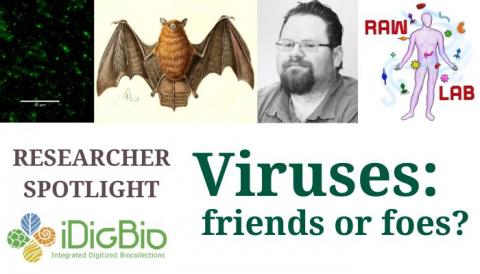
Dr. Richard Allen White III is a computational and molecular virologist at the University of North Carolina at Charlotte. He works to understand the virosphere, how it interplays with the environment, and how it interacts with humans and reservoir mammals.
He has been an Assistant Professor at UNC Charlotte for four years. Prior to his current position, he worked at the Pacific Northwest National Laboratory and did his PhD at the University of British Columbia in Vancouver. Since the COVID-19 pandemic, he has shifted his focus toward understudied viruses that could potentially cause the next pandemic. In his 2024 iDigBio Digital Data Conference presentation, he talked about how museum collections help virologists understand the natural history of viruses, their host range, evolution, and potentially how they emerge. Museum collections have been essential to Dr. White's research and he aims to involve the museum community as much as possible in his future work.
"Collections provide a natural history of a host species that no other medium or resource can provide," Dr. White said. Bats make up 20-25% of all mammals on Earth, and provide a reservoir for novel viruses (e.g., coronaviruses) inside their bodies which can be detrimental to humans. His work with his lab (i.e., the RAW lab) utilizes museum collections to study viruses and how hosts respond to infection. They are taking a deep dive into bat T cell immunity, especially CD8+ cytotoxic T-cells known to kill virally infected cells.
Dr. White's NIH-funded grant, Bat Immunology Training and Education (BITE), led in collaboration with Co-PI Dr. Cody Thompson, is working to resolve T cell immunity and development in bats. "Museum collections via CT scanning provided a window into the immune system of bats," Dr. White said. Collections offered a huge diversity of specimens, providing the necessary preliminary data to acquire funding for the BITE project. "Without collections, our work would be much harder, if not improbable altogether."
Not only that, but BITE is also training the next generation of viral immunoecologists in essential skills to prevent the next pandemic. These skills encompass molecular virology, computational analysis, ecology, fieldwork, and the use of museum collections. White and Thompson provide these fundamental cross-disciplinary skills within the BITE project to students at UNC Charlotte and the University of Michigan. BITE is also engaging in museum outreach to teach the public about bats, their ecology, their roles in ecosystems, and the role that museums have in the conservation of natural diversity.
In a battle against your enemy, which virus would you want fighting by your side? When asked this ridiculous question, Dr. White gave a very thoughtful answer: bacteriophages. Bacterial viruses, or phages, are viruses that only infect and kill bacteria. Dubbed the "silent pandemic", the growing problem of antibiotic resistance poses a major threat to human health, and we are currently losing the battle against it. Phage therapy, however, uses phages to kill bacteria that are resistant to antibiotics and has been a newly incorporated part of his work.
As a virologist, Dr. White understands that viruses are often viewed with apprehension and require careful monitoring. However, he also emphasizes that not all viruses are harmful to humans. Viruses are tremendously abundant and diverse. In fact, viruses within the human body may protect against harmful pathogenic bacteria by training and regulating our immunity. They are agents of natural selection and evolution, providing mechanisms of horizontal gene transfer. Ancient human viruses led to the development of myelin sheaths in our neurons and the development of our placenta. Your mouth contains about the same number of viruses as there are stars in the Milky Way galaxy. With that galactic amount of interplay, there is no doubt that viruses are as essential as they are deadly. He emphasizes the importance of being proactive, rather than reactive, in pinpointing viruses of concern before they emerge, which could make a huge difference in preventing the next global pandemic. Dr. White urges scientists to come together to address pressing issues in global health.
Written by Makena Lang







